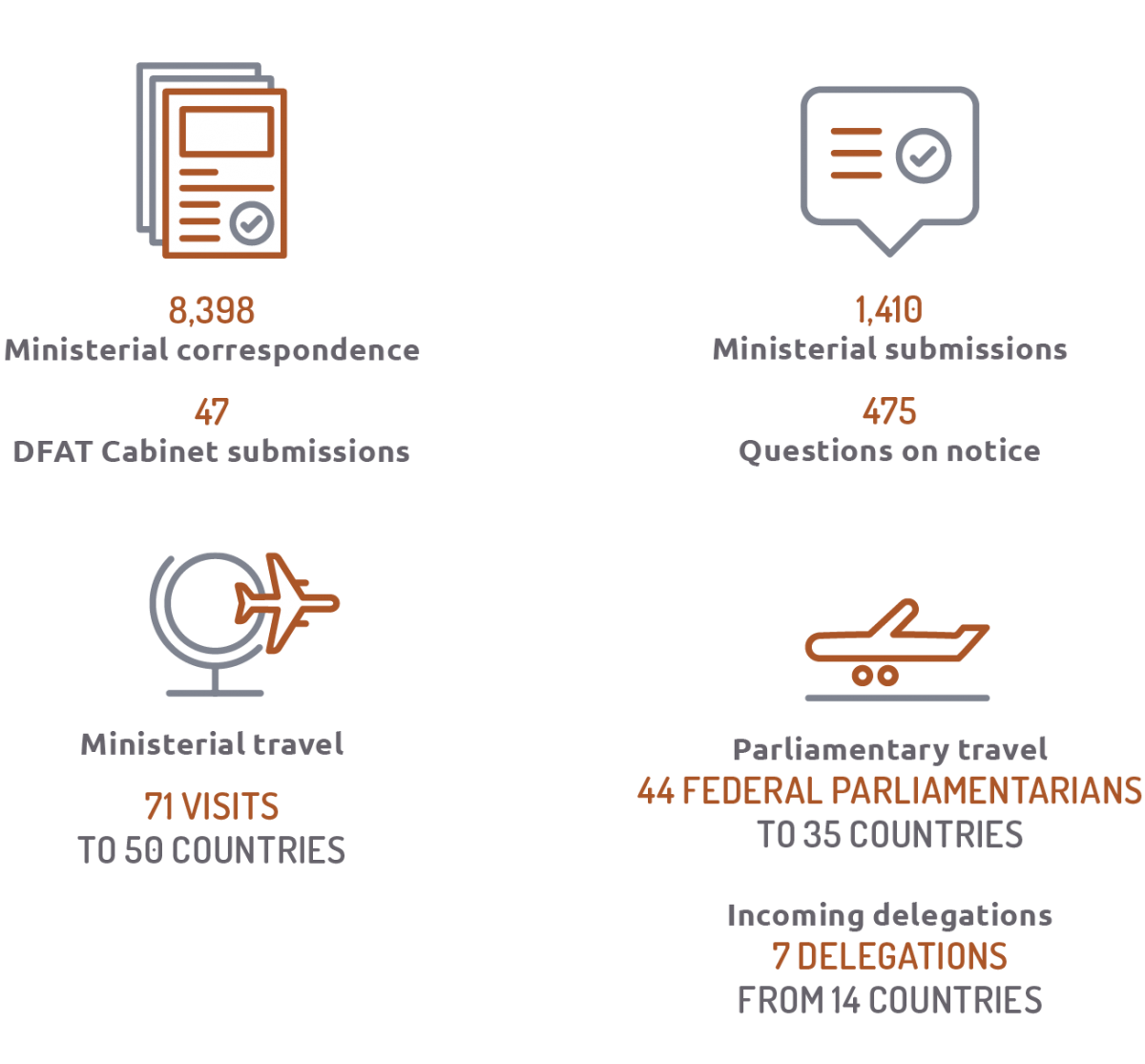Shaping outcomes which reflect Australia’s interests, including through coalition-building with international partners.
Building Pacific collaboration through the Regional Assistance Mission to Solomon Islands
![Leaders of the Regional Assistance Mission to Solomon Islands (RAMSI) participating Pacific Island nations, RAMSI special coordinators (past and present) and current senior managers of RAMSI’s Participating Police Forces at the RAMSI Symposium, Honiara, Solomon Islands, 28 June 2017. [DFAT/Peter Lothian] Leaders of the Regional Assistance Mission to Solomon Islands (RAMSI) participating Pacific Island nations, RAMSI special coordinators (past and present) and current senior managers of RAMSI’s Participating Police Forces at the RAMSI Symposium. [DFAT/Peter Lothian]](../../../wp-content/uploads/2017/09/036-1280x960.jpg)
Building Pacific collaboration through the Regional Assistance Mission to Solomon Islands
On 30 June 2017 the Regional Assistance Mission to Solomon Islands (RAMSI) concluded after 14 years. RAMSI restored law and order, rebuilt the central institutions of government and provided the environment for resumed economic growth. In so doing, RAMSI averted the emergence of a failed state on Australia’s doorstep.
The department provided strategic oversight of RAMSI led by seven special coordinators. RAMSI also deployed civilian advisers from a range of government agencies including the department itself, the Department of Finance and the Treasury. The Australian Federal Police led a multinational police force, which was backed by a large five-nation military component commanded by the Australian Defence Force.
RAMSI’s regional character was a defining element of its success and a source of pride for Pacific nations. From the outset, it was a cooperative partnership between Solomon Islands and the then 15 Pacific Islands Forum member states. Personnel from Australia, Cook Islands, Fiji, Kiribati, Nauru, New Zealand, Papua New Guinea, Samoa, Tonga and Vanuatu deployed to Solomon Islands from the first day, with Niue contributing police from 2006 onwards. RAMSI was endorsed by the region and operated under a clear legal framework—the RAMSI Treaty.
Five formal reviews of operation concluded that its regional composition meant RAMSI was better able to understand and work with the local people and cultures. The collective regional contributions also created bonds and networks that did not exist previously between governments and security forces. This cross-pollination of skills and expertise has benefited countries in the Pacific more broadly.
RAMSI is internationally recognised as a leading example of a successful stabilisation intervention. At a speech to the UN Peacebuilding Commission in June 2017, Solomon Islands Prime Minister Manasseh Sogavare singled out Australia’s leadership of RAMSI as one of the key drivers of its success. RAMSI also retained high levels of support with Solomon Islanders throughout its operation, consistently scoring 85 per cent or above in surveys carried out from 2006 to 2013.
With the conclusion of RAMSI, Australia and Solomon Islands have agreed a bilateral treaty. It allows Australia to deploy police, defence or civilian personnel in an operational capacity in the event of an emergency, following consideration of a request from the Solomon Islands Government. The department led whole-of-government development, negotiation and finalisation to enable the treaty to enter into force in 2017–18.
Drawing on the lessons of RAMSI, the bilateral security treaty allows Australia to partner with regional countries if required.
Through the department-staffed Office of the Special Coordinator, and in conjunction with the Australian High Commission in Honiara, we managed the transition from RAMSI to bilateral police, justice and governance programs. Australia secured strong support from the Solomon Islands Government for this transition. The department also coordinated Australia’s representation at the series of high-profile RAMSI farewell events in Honiara in June 2017.
The RAMSI experience, as well as recent responses to Tropical Cyclones Pam (2015) and Winston (2016), has provided a strong platform to enhance regional security collaboration as well as regional humanitarian and disaster relief mechanisms. RAMSI has also highlighted the need for holistic cooperation across the breadth of the challenges facing the Pacific, in order to avoid the need for an intervention of this type and scale in the future.
![Assistant Minister for Trade, Tourism and Investment Keith Pitt addressing the Global Heads of Mission Meeting. [DFAT/Mark Graham]](../../../wp-content/uploads/2017/09/026-1024x682.jpg)
![Minister for Foreign Affairs Julie Bishop and US Secretary of State Rex Tillerson in Sydney for the Australia–United States Ministerial Consultations. [US EMBASSY, CANBERRA]](../../../wp-content/uploads/2017/09/028-1024x683.jpg)
![Assistant Minister for Trade, Tourism and Investment Keith Pitt with Tongan Prime Minister Akilisi Pohiva and representatives of the other member countries at the PACER Plus signing ceremony. [DFAT/Ana Kolokihakaufisi]](../../../wp-content/uploads/2017/09/032-1024x587.jpg)


![Minister for Foreign Affairs Julie Bishop with Defence Minister Marise Payne, German Foreign Minister Frank-Walter Steinmeier and German Defence Minister Ursula von der Leyen in the garden of the Guest House of the German Foreign Office, the Villa Borsig, in Berlin, 6 September 2016, in a break of the 2+2 consultations. [PHOTOTEK/Michael Gottschalk] Minister for Foreign Affairs Julie Bishop with Defence Minister Marise Payne, German Foreign Minister Frank-Walter Steinmeier and German Defence Minister Ursula von der Leyen in the garden of the Guest House of the German Foreign Office, the Villa Borsig, in Berlin, in a break of the 2+2 consultations. [PHOTOTEK/Michael Gottschalk]](../../../wp-content/uploads/2017/09/040-1280x960.jpg)
![Minister for Foreign Affairs Julie Bishop at the Joint Security Area, Demilitarized Zone, Panmunjom, Republic of Korea, with soldiers from the United Nations Command guarding the Military Demarcation Line, 18 February 2017. [Lee Gang-gook] Minister for Foreign Affairs Julie Bishop at the Joint Security Area, Demilitarized Zone, Panmunjom, Republic of Korea, with soldiers from the United Nations Command guarding the Military Demarcation Line. [Lee Gang-gook]](../../../wp-content/uploads/2017/09/042-1280x960.jpg)